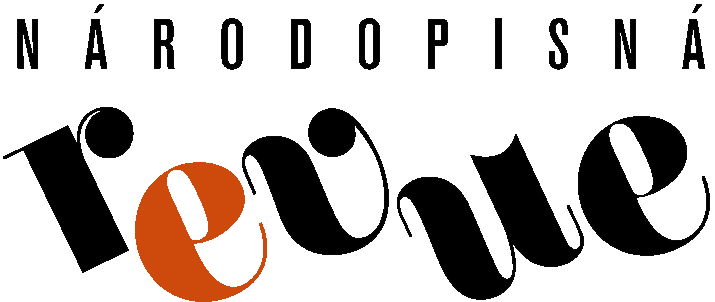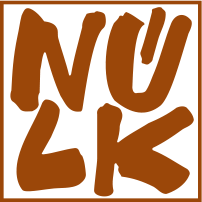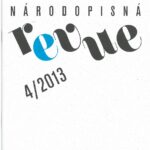Journal of Ethnology 4/2013 is devoted to expatriates. Zdeněk Uherek sketches the theme from the point of view of migration and he deals with the factors determining the formation of expatriates’ communities in Europe (Expatriates and Contemporary Migration Processes). Stanislav Brouček pays attention to Czech and Slovak immigrants who settled down in Australian island Tasmania (“Czechoslovakism” at the End of the World: Expatriates in Tasmania). Veronika Beranská focuses on the system of traditional medicine in the culture of Ukrainian and Kazakhstanian Czechs (Expatriates’ Folk Treatment and Ritualized Practises with Czechs from Ukraine and Kazakhstan Transferred to the Czech Republic). Barbora Kučerová reminds an enclave of Czech immigration in Central Poland (Contemporary Situation at Evangelic Reformed Church in Zelów on Example of Mixed Marriages) and Dagmar Petišková writes about Ukrainian immigrants in the USA and Canada (Ukrainian Diaspora in North America – its culture and publications related to ethnography).
Transferring traditions column publishes a contribution by Lucie Šilerová and Frank Trnka Czech, Moravian and Slovakian Traditions of Expatriates in Minneapolis (St. Paul, MN, USA). Review section remembers Jaroslav Mackerle and his ethnographic publication about the ethnographic area of Malá Haná (author Lukáš F. Peluněk). The Interview column is devoted to the musician Jiří Pavlica (born 1953). Social Chronicle mentions the anniversaries of ethnologists Jitka Matuszková (born 1953) and Jiřina Veselská (born 1943). Other regular columns offer reports from conferences and exhibitions, reviews of new books and other information from the branch, including a proposal of the Ethical Codex of the Czech Ethnographic Society.
Expatriates and Contemporary Migration Processes
The text is an introduction to the Journal of Ethnology’s monothematic issue about expatriates. Its goal is to classify the theme into a wider context, to show that the relation to expatriates differs in different countries and to demonstrate that in many countries the emigration and the relations to expatriates constitute a significant component of the history and a part of processes of national identification. The text also deals with factors that strengthen the relation between the source and the destination country in the process of migration. It shows that the theme of expatriates does not include only the theme of migration but also that of return migrations. From this point of view, the topicality of the theme of expatriates in Europe and the Czech Republic has rather increased than decreased recently. The examples of particular communities of expatriates come mainly from Europe. The author focused on the examples with Czech expatriates; partially he speaks about German, Polish, Irish and Armenian communities. In the conclusion, he mentions the contemporary trend of double residence and transnational lifestyle.
„Czechoslovakism“ at the End of the World: Expatriates in Tasmania
Based on written materials, interviews and exiting literature, the study reveals the process of “experienced Czechoslovakism” with Czech and Slovak immigrants in Tasmania, who have immigrated since the 1950s until now. The study proceeds on two factors that influence their adaptation. The first one was the experience of a specific transfer, actually a repeated flight (especially with those who emigrated after 1948). The other factor consisted in the changing migration policy in Australia. The time and the problem relates to basic parameters of their new existence, which they understand as a space for self-expression. The experienced Czechoslovakism was implemented in the sense of the citizenship that was taken away of them, but to which they claimed their allegiance. This is a slight paradox, i.e. what they in fact did not have (the Czechoslovak citizenship) became their mutual bonds. When returning to their original homeland (after 1989), however, they found out that especially the quality of interpersonal relations both in the Czech Lands and in Slovakia did not correspond to the standards they got used to, and they perceived and practised in Tasmanian environment. This fact led the most of them to a more conscious identification with their new home in Tasmania and upset their intention to re-emigrate back to Bohemia, Moravia or Slovakia.
Expatriates´ Folk Treatment and Ritualized Practises with Czechs from Ukraine and Kasakhstan Transferred to the Czech Republic
The study writes about folk treatment and related practices as they have survived in the memory of Czech expatriates transferred from the regions of the former Soviet Union, namely from Ukraine and Kasakhstan, to the Czech Republic. A special attention is paid to ritualized practices and folk magic associated with the word, such as healing procedures, exorcism, and incantation. The means and approaches of folk medicine are viewed from the angle of ethno-medicine and medical anthropology. The presented knowledge are based on a field research among the expatriates transferred to the Czech Republic between 1991-1993, mainly from the regions of Zhitomir and Kiev in Ukraine, and between 1994-2001 from Kasakhstan. The field research was implemented between 2009-2012 in the whole Czech Republic. The mentions about folk treatment and related practices were recorded in nine locations. Fifty persons altogether were asked about folk treatment. As confirmed by the field research, the transferred expatriates used ritualized practices and applied exorcism in folk treatment. They have kept in their memories some practices and healing means recipes until today, twenty years after their transfer to the Czech Republic.
Contemporary Situation at Evangelic Reformed Church in Zelów on Example of Mixed Marriages
The contribution based on a field research pays its attention to changes in understanding the ethnicity and religious affiliation with the people of Czech origin in Polish Zelów. The original concept connecting these two elements of identity survives only with the people born before the second re-emigration in 1945. Younger members of the evangelic reformed church with Czech ancestors consider themselves to be Poles of Czech origin. The cohesiveness has got looser since the 1960s when the people began to enter into mixed marriages. This fact shifted the language to the preferred use of Polish as their mother tongue. It was the newly founded Society of Czechs in Poland and its Czech Club presenting the Czech traditions in Zelów that has pointed out the Czech origin of individuals recently. However, the religious affiliation still remains the most important element in the life of Poles of Czech origin. The conversion as well as mixed marriages, which predominate nowadays, can be understood as elements regenerating the evangelic reformed church and ensuring its continuity.
Ukrainian Diaspora in North America – its culture and publications related to ethnography
Mass emigration of Ukrainians to the United States and Canada ran in four main streams - first for the social and economic reasons, then for the political ones. For the entire period of its existence, the local Ukraine community, which identifies profoundly with its roots, has tried to maintain their national traditions. Particular attention is paid to the third and most important wave of Ukrainian emigration to North America, because it involved the community of Ukrainian politicians, artists, and scientists who found their home in Czechoslovakia in the inter-war period. The contribution introduces the most valuable collections of Ukrainian museums in the USA and Canada and essential social and scientific institutions as well as ethnographic studies of Ukrainian Diaspora.



